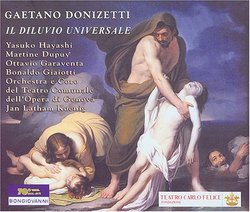| All Artists: Gaetano Donizetti, Jan Latham-Koenig, Orchestra del Teatro Comunale dell'Opera di Genova, Aldo Bottion, Annunziata Lia Lantieri, Bonaldo Giaiotti, Bruno dal Monte, Daniela Broganelli, Gloria Scalchi, Manlio Rocchi, Martine Dupuy, Nicola Pigliucci, Ottavio Garaventa, Yasuko Hayashi Title: Donizetti: Il Diluvio Universale Members Wishing: 1 Total Copies: 0 Label: Bongiovanni Original Release Date: 1/1/2005 Re-Release Date: 10/25/2005 Album Type: Import Genre: Classical Style: Opera & Classical Vocal Number of Discs: 2 SwapaCD Credits: 2 UPCs: 675754866020, 8007068238620 |
Search - Gaetano Donizetti, Jan Latham-Koenig, Orchestra del Teatro Comunale dell'Opera di Genova :: Donizetti: Il Diluvio Universale
 | Gaetano Donizetti, Jan Latham-Koenig, Orchestra del Teatro Comunale dell'Opera di Genova Donizetti: Il Diluvio Universale Genre: Classical
|
Larger Image |
CD Details |
CD ReviewsSatisfying John Cragg | Delta(greater Vancouver), B.C Canada | 05/25/2008 (5 out of 5 stars) "For most of this opera Donizetti is in top form -- the Donizetti of Lucia and the other major works, full of intriguing ideas and ways of presenting them -- though at times he slips into banality and the appropriateness of the music to the words he is setting can be a bit peculiar. For instance, the material Donizetti later used in La Fille du Regiment -- very appropriately there as Marie's aria "Chacun le Sait" -- here is employed for Noah to declame the purpose and importance of the ark. That, of course, does not diminish the fact that it is a great tune, and if you don't pay attention to the words, the effect is highly entertaining.
The libretto itself is a curious mixture of serious biblical story and an added on rivalry for Noah's affections more out of desparate housewives than the Bible. By and large, Donizetti is highly successful in merging the two strands to produce an exciting opera. It is indeed surprising -- especially given how much second-rate Donizetti has been put on in recent years -- that this opera has not been mounted in serious productions, other than the concert performance by Opera Rara on which this recording is apparently based. The performance itself is adequate, but not stunning. Of the soloists, the best is Mirco Palazzi,in the crucial role of Noah. Manuela Custer produces some lovely and thoughtful singing. By contrast, unfortunately, Majella Cullagh comes across as rather harsh, and not really being at home with all her music. The tenor, Colin Lee, is adequate. The conducting has some strange moments, but is by and large competent and the orchestra and chorus are first-class. One can only speculate as to whether a really topdrawer cast and conductor would raise this to a really exciting opera, but the version here available is highly satisfying. The accompanying booklet is, as expected from Opera Rara, both opulent and rather stodgy. The lengthy essay by Jeremy Commons is long on irrelevant trivia about the first performance, and sadly deficient in discussion of what version is actually recorded and who perpared the performing edition used here,as well as being short on useful analysis. One gathers that the version used is really the second, 1834, one -- which makes much of the material about the first performance of even less interest than usual. The Italian libretto is presented along with an English translation." |

 Track Listings (19) - Disc #1
Track Listings (19) - Disc #1